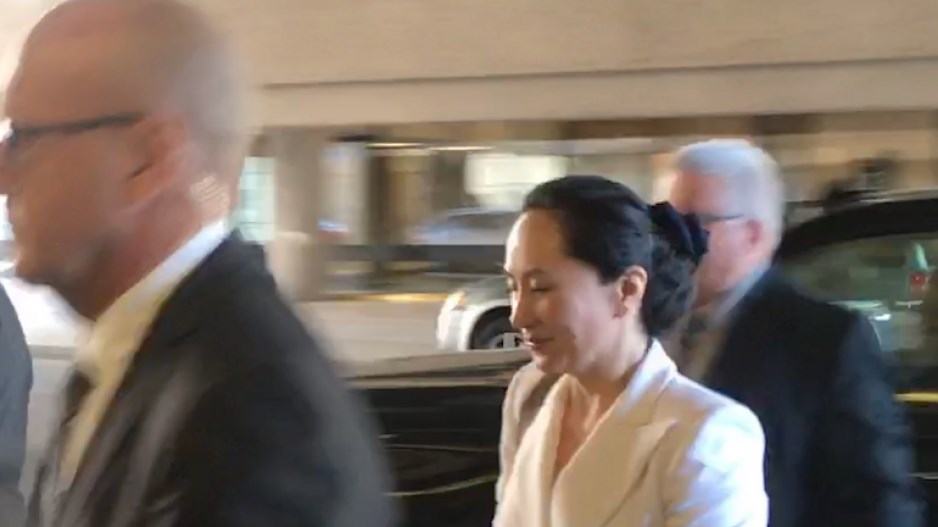The extradition hearing of Huawei Technologies Co. Ltd. CFO Meng Wanzhou resumes on Monday after about a month’s hiatus - with the focus shifting to the admissibility of specific documents as evidence, per the request by defense lawyers.
Defence lawyer Scott Fenton opened Monday's proceedings by arguing that Meng's team does not need to establish the full merits of the information disclosure it seeks from the Attorney General of Canada, since legal precedents said the defence only had to establish a reasonable air of a possibility that an abuse-of-process took place. That bar, Fenton said, is "not high" and can easily be reached by Meng's defence argument.
“The defence must simply demonstrate that their application has a reasonable basis...," Fenton said. “It’s a screening motion that should not be elevated to the full level of merit, which is – and I say with respect – the feeling I get when I read [the Crown’s] material on determining these information on its merits.”
He added during Monday’s proceedings that the United States authorities displayed a pattern of behaviour in omitting or misrepresenting key information in its record of the case (ROC) and supplemental record of the case (SROC) – documents that form the basis of the U.S. Department of Justice's charges against Meng.
“Where the requesting state fails in its duty [of candour], the court must intervene to safeguard the liberty of the person sought and to preserve the fairness and the integrity of the proceedings,” Fenton said. “Our submissions today clear the low bar of an air of reality that an allegation can be sustained.”
Fenton said the main issue comes with the ROC and SROC's description of a powerpoint presentation made by Meng to HSBC detailing Huawei's alleged relationship to Skycom, a subsidiary that operated in Iran (thus violating U.S. sanctions and putting the bank at risk of loss). Fenton said the ROC and the SROC misrepresented Meng in hiding Huawei's links to Skycom, when the powerpoint made it clear that HSBC was aware of the two companies' relationship.
Defence lawyers also contended there were other cases of the United States misrepresenting facts in its ROCs – from mislabelling the HSBC executive who knew about Huawei’s relations with Skycom as a junior employee to the representation that U.S.-dollar transactions from Skycom/Huawei’s operations in Iran had to pass through the banking system in the United States (thus triggering U.S. jurisdiction on the case).
"This is really the elephant in the room in that it’s not explained quite properly in the ROC," he said, accusing U.S. authorities of “cherry-picking” parts of the presentation to make its case. "It’s critical to understand there is no causal link – there could not be – between the applicant’s statement in the powerpoint... and any risk to HSBC because it was on-notice."
Associate chief justice Heather Holmes - the judge presiding over extradition hearing proceedings here in Vancouver – challenged the defence line of logic on several fronts on Monday, including an assertion from Fenton that the ROC attributed a statement about the knowledge of Huawei’s relations with Skycom to an HSBC internal risk committee, thus proving the bank had knowledge of the risk of violating U.S. sanctions.
“It seems to be attributed to Huawei,” Holmes said in court. “It does not seem that the HSBC risk committee had discovered this on their own.”
The judge also questioned – when considering Fenton’s stance that Meng’s 2013 powerpoint must be considered in its entirety by the court – whether she should be pulling back even further to look at the reason for the HSBC-Meng meeting itself: The bank’s concerns about Skycom/Huawei’s business in Iran.
Meng’s legal council has maintain its position that the court needs to have access to records and communique between Canadian authorities (the Canada Border Services Agency and the RCMP) and U.S. officials ahead of the Huawei executive’s 2018 arrest in order to determine whether there was a conspiracy to detain Meng at the airport for three hours to collect evidence prior her formal arrest.
The Attorney General of Canada has stated that some of the information sought by Meng’s defense team pertains to national security operations and should not be disclosed. On Aug. 21, federal court judge Catherine M. Kane in Ottawa sided with Crown counsel in keeping six of the requested documents from being disclosed.
In her decision, Kan said the redacted information being requested by Meng “does not respond to or illuminate the allegation of abuse of process” - Meng’s final topic of contention in these extradition hearings in alleging that the United States is using the Canada-U.S. extradition agreement to arrest the Huawei executive and potentially use her as a negotiating chip in trade talks with China, something that has been mentioned by U.S. President Donald Trump.
“Taking into account the relevant factors, including the probative value of such information and the nature and extent of the injury, the Court finds that the public interest in disclosure to Ms. Meng of the remaining redacted information would be outweighed by the public interest in non-disclosure,” Kane said in her ruling.
Arguments this week will likely revolve around additional information that may or may not be disclosed for court consideration in the abuse-of-process discussions.
Back in the spring, Holmes dealt the first blow to Meng’s defense when she ruled that the double-criminality requirement (that Meng’s alleged crimes of fraud and money laundering were arrestable offences in Canada as they are in the U.S.) has been met by Crown counsel and therefore does not give the court a reason to stay the proceedings against Meng.
This week’s proceedings are expected to last the entire week.




